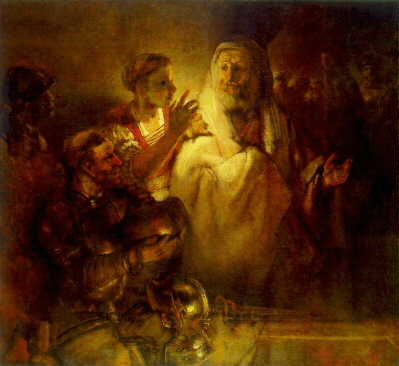¶ Love
unknown.
DEare Friend, sit down, the tale is long and sad:
And in my faintings I presume your loue
Will more complie then help. A Lord I had,
And have, of whom some grounds, which may improve,
I hold for two lives, and both lives in me.
To him I brought a dish of fruit one day,
And in the middle plac’d my heart, But he
(I sigh to say)
Lookt on a servant, who did know his eye
Better then you know me, or (which is one)
Then I my self. The servant instantly
Quitting the fruit, seiz’d on my heart alone,
And threw it in a font, wherein did fall
A stream of bloud, which issu’d from the side
Of a great rock: I well remember all,
And have good cause: there it was dipt and dy’d,
And washt, and wrung: the very wringing yet
Enforceth tears. Your heart was foul, I fear.
Indeed ‘tis true. I did and do commit
Many a fault more then my lease will bear;
Yet still askt pardon, and was not deni’d.
But you shall hear. After my heart was well,
And clean and fair, as I one even-tide
(I sigh to tell)
Walkt by my self abroad, I saw a large
And spacious fornace flaming, and thereon
A boyling caldron, round about those verge
Was in great letters set AFFLICTION.
The greatnesse shew’d the owner. So I went
To fetch a sacrifice out of my fold,
Thinking with that, which I did thus present,
To warm his love, which I did fear grew cold.
But as my heart did tender it, the man,
Who was to take it from me, slipt his hand,
And threw my heart into the scalding pan;
My heart, that brought it (do you understand?)
The offerers heart. Your heart was hard, I fear.
Indeed it’s true. I found a callous matter
Began to spread and to expatiate there:
But with a richer drug then scalding water
I bath’d it often, ev’n with holy bloud,
Which at a board, while many drunk bare wine,
A friend did steal into my cup for good,
Ev’n taken inwardly, and most divine
To supple hardnesses. But at the length
Out of the caldron getting, soon I fled
Unto my house, where to repair the strength
Which I had lost, I hasted to my bed.
But when I thought to sleep out all these faults
(I sigh to speak)
I found that some had stuff’d the bed with thoughts,
I would say thorns. Deare, could my heart not break,
When with my pleasures ev’n my rest was gone?
Full well I understood, who had been there.
For I had giv’n the key to none, but one:
It must be he. Your heart was dull, I fear.
Indeed a slack and sleepie state of minde
Did oft possesse me, so that when I pray’d,
Though my lips went, my heart did stay behinde.
But all my scores were by another paid,
Who took the debt upon him. Truly, Friend,
For ought I heare, our Master shows to you
More favour then you wot1 of. Mark the end.
The Font did onely, what was old, renew:
The Caldron suppled, what was grown too hard:
The Thorns did quicken, what was grown too dull:
All did but strive to mend, what you had marr’d.
Wherefore be cheer’d, and praise him to the full
Each day, each houre, each moment of the week,
Who fain would have you be new, tender, quick.
|
